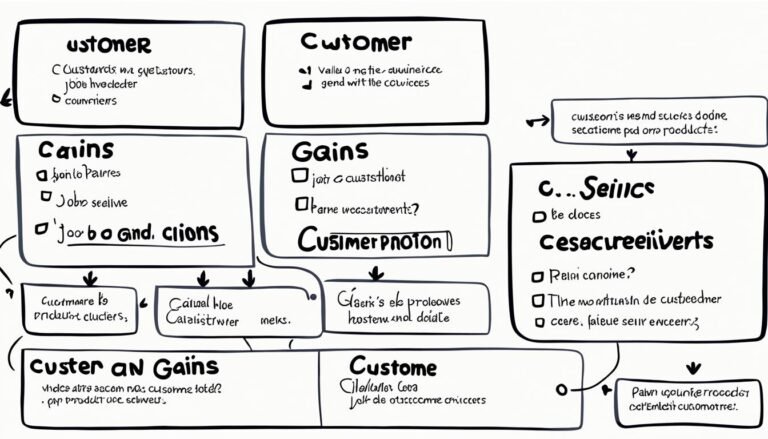Master Persuasive Communication in Sales
Effective communication is a crucial skill in the world of business. It forms the foundation of successful relationships, drives productivity, and influences decision-making. In the realm of sales, persuasive communication holds immense power. It involves the art of presenting arguments to move, motivate, or change an audience.
For entrepreneurs, mastering persuasive communication is essential for success. It enables them to market themselves effectively, deliver their point with impact, and establish themselves as a brand in the industry. Whether it’s influencing customers to buy their products or inspiring their employees, persuasive communication allows entrepreneurs to wield the power of persuasion in a positive and ethical way. By making their message relatable and compelling, they can draw people to them and create meaningful connections.
In this article, we will explore the importance of persuasive communication in sales, share tips to master this skill, delve into the role of communication skills in sales excellence, discuss the power of words in persuasive communication, emphasize the need to understand and empathize with the audience, and provide insights on how to structure and deliver persuasive messages with confidence.
Key Takeaways:
- Persuasive communication is essential for entrepreneurs to succeed in sales and marketing.
- Understanding your audience and tailoring your message to their needs is crucial.
- Establishing credibility, conveying the benefits, and listening actively are key elements of persuasive communication.
- Choosing the right words and delivering your message with confidence enhance persuasive impact.
- Mastering persuasive communication requires practice, insight, and adaptability.
Importance of Persuasive Communication in Sales
Persuasive communication plays a crucial role in the world of business, particularly in sales and marketing. It enables entrepreneurs to connect with the right people and effectively convince them of the value of their products or services. By mastering persuasive communication, entrepreneurs can market themselves, showcase their leadership qualities, deliver their message with impact, and establish themselves as role models in their industry.
One of the key benefits of persuasive communication is its ability to use manipulation in a positive way. Entrepreneurs can employ persuasive tactics to inspire customers to make purchasing decisions or motivate employees to achieve their goals. By understanding and speaking to the needs and desires of their target audience, entrepreneurs can make their message relatable and draw people towards them.
The importance of persuasive communication in sales cannot be overstated. It is a critical skill for sales success as it allows salespeople to effectively engage with customers, build meaningful connections, and guide them towards making buying decisions. By crafting persuasive messages that capture the attention and interest of their audience, salespeople can influence and persuade customers in a natural and compelling manner.
Benefits of Persuasive Communication in Sales:
- Building trust and credibility with customers
- Influencing customers’ decision-making process
- Conveying the value and benefits of products or services
- Addressing customer objections and concerns effectively
- Creating long-lasting customer relationships
Mastering persuasive communication in sales requires a deep understanding of the audience, effective message structuring, and the power of carefully chosen words. Sales professionals who can confidently deliver persuasive messages are more likely to succeed in closing deals and achieving their sales targets.
Tips to Master Persuasive Communication in Sales
Mastering persuasive communication is crucial for success in sales. Whether you’re presenting a product, negotiating a deal, or convincing a potential client, effective communication can make all the difference. Here are some tips to help you become a persuasive communicator:
- Know your audience: Craft your message based on who you’re speaking to and address their needs, values, and desires. Understanding your audience will allow you to tailor your communication to resonate with them.
- Establish credibility: Demonstrate your expertise and back up your claims with statistics and examples. Building trust and credibility will make your audience more receptive to your message.
- Make your argument meaningful: Show the benefits of what you’re proposing to resonate with your audience. Help them see how your ideas will improve their company or meet their requirements and goals.
- Convey the benefits: Explain how your ideas will improve their company or meet their requirements and goals. Clearly articulate the positive impact your product or service will have on their business.
- Listen carefully: Be a top-notch listener to understand your audience’s needs and wants. Pay attention to their concerns and questions and address them in your communication.
- Have a succinct approach: Communicate clearly and concisely to keep up with the fast-paced business world. Avoid unnecessary jargon or complex language that might confuse your audience.
- Know your outcome: Clearly define what outcome you hope to achieve before speaking. Having a clear goal in mind will help you structure your communication and guide your message towards that desired outcome.
Mastering persuasive communication in sales takes practice, but with these tips, you can improve your ability to connect with your audience, build rapport, and ultimately, close more deals.
The Role of Communication Skills in Sales Excellence
Effective communication is a vital skill for salespeople as it allows them to convey critical information, build relationships, and close deals. In the competitive world of sales, mastering communication techniques for sales success is essential.
Empathy serves as the foundation of effective communication in sales. By understanding and connecting with customers on an emotional level, salespeople can establish rapport and trust. This empathetic approach enhances the overall sales experience and increases the chances of success.
Active listening is another crucial skill for salespeople. By attentively listening to their customers’ needs and concerns, salespeople can tailor their message and provide solutions that align with the customers’ goals and preferences. This active engagement fosters deeper customer relationships and increases the likelihood of a successful sale.
Nonverbal communication, including body language, plays a significant role in effective sales communication. Salespeople should focus on maintaining a confident posture, maintaining eye contact, and using appropriate gestures to reinforce their message. A positive and confident nonverbal demeanor enhances the salesperson’s credibility and fosters trust with customers.
Salespeople should also be adaptable in their communication style. Each customer is unique, with different communication preferences and needs. By adapting their approach, salespeople can effectively engage with customers and deliver their message in a way that resonates with them. This versatility in communication contributes to successful sales interactions.
Mastering persuasive communication is the pinnacle of sales excellence. It allows salespeople to guide customers towards closing a sale in a natural and compelling way. By utilizing persuasive techniques such as storytelling, framing, and presenting compelling evidence, salespeople can influence customers and motivate them to take action.
| Key Communication Skills for Sales Excellence: | Benefits: |
|---|---|
| Empathy | – Establishes rapport and trust – Enhances the overall sales experience |
| Active listening | – Tailors the message to customer needs – Builds stronger customer relationships |
| Nonverbal communication | – Reinforces credibility and trust – Enhances overall message delivery |
| Adaptability | – Connects with individual customer preferences – Delivers messages effectively |
| Persuasive communication | – Guides customers towards closing a sale – Influences customer behavior |
The Power of Your Words in Persuasive Communication
Words have an immense influence in the world of business. They possess the ability to make or break persuasive communication efforts. To effectively engage your audience and persuade them, understanding their needs and tailoring your message accordingly is crucial. Clearly defining your goals and structuring your argument with concrete evidence and a compelling call to action helps in achieving persuasive communication.
When selecting words for your message, it is vital to choose them thoughtfully. Avoid using jargon or technical terms that may confuse your audience. Instead, opt for clear and concise language that resonates with them, ensuring that your message is easily understood. Each word you select should contribute to the overall impact of your persuasive communication.
“The power of words is immense. They can inspire, motivate, and change minds. By carefully considering the words we choose, we can craft persuasive messages that capture the attention and drive action.”
Speaking confidently and conveying belief in your message increases the likelihood of persuading your audience. Confidence is contagious, and when you speak with conviction, your audience is more likely to trust and be persuaded by your words.
To illustrate the impact of your words, check out the following table that highlights some persuasive communication strategies:
| Persuasive Communication Strategies | Description |
|---|---|
| Emotional Appeal | Connect with your audience’s emotions to create a compelling message that resonates with them. |
| Storytelling | Engage your audience by sharing captivating stories that illustrate the benefits of your product or service. |
| Social Proof | Highlight testimonials and case studies to demonstrate the positive experiences of others who have used your product or service. |
| Strong Call to Action | Create a sense of urgency and compel your audience to take immediate action. |
Remember, the power of words lies in their ability to captivate, convince, and connect. By using persuasive language and communication strategies effectively, you can elevate your persuasive communication skills and achieve success in the business world.
Understand and Empathize with Your Audience
Understanding your audience is crucial in persuasive communication. By knowing your audience, you can tailor your message to their specific needs, desires, and motivations. This level of understanding allows you to connect with them on a deeper level and establish a meaningful connection.
Empathy plays a key role in effective communication. When you show genuine empathy towards your audience, you create a sense of trust and understanding. By putting yourself in the customer’s shoes, you can address their concerns and show them that you truly care about helping them.
Active listening is another essential skill in understanding your audience. By actively listening to their concerns, needs, and desires, you can gather valuable information that will help you tailor your offer and make it more appealing to them.
“To effectively communicate, we must realize that we are all different in the way we perceive the world and use this understanding as a guide to our communication with others.” – Tony Robbins
By understanding and empathizing with your audience, you can create persuasive communication that resonates with them and drives them towards action.
Building Trust through Empathy
Empathy is a powerful tool in sales communication. When you show genuine empathy towards your customers, it creates a sense of trust and rapport. When customers feel understood and listened to, they are more likely to engage with your message and consider your offer.
Putting yourself in the customer’s shoes allows you to understand their pain points, challenges, and aspirations. It enables you to craft your message in a way that speaks directly to their needs and desires, making it more compelling and persuasive.
The Power of Active Listening
Active listening is a crucial skill in sales communication. It involves fully engaging with the customer, paying attention to their verbal and non-verbal cues, and seeking to understand their perspective.
By actively listening, you can gather valuable information about your customer’s needs, preferences, and objections. This information allows you to tailor your offer and address their concerns directly.
“Most people do not listen with the intent to understand; they listen with the intent to reply.” – Stephen R. Covey
By actively listening and demonstrating empathy, you can build stronger relationships with your customers and significantly increase your chances of making a successful sale.
Structure Your Message to Create Impact
When it comes to persuasive communication, the way you structure your message plays a significant role in creating impact and effectively conveying your point. A well-structured message not only captures your audience’s attention but also guides them towards the desired outcome.
To create a structured message that resonates with your audience, it is essential to break it down into different parts:
- Introduction: Begin your message with a strong and compelling introduction to grab your audience’s attention. Clearly state your main point or proposition right from the start.
- Supporting evidence: Back up your main point with relevant facts, statistics, or examples. This helps strengthen your argument and adds credibility to your message.
- Recap with a call to action: Towards the end of your message, provide a concise recap of your main points and conclude with a clear call to action. This encourages your audience to take the desired next step.
By structuring your message in this way, you create a logical flow that guides your audience’s understanding and compels them to act. Each part of your message serves a purpose, building upon the previous one to create a persuasive and impactful communication.
“The structure of a persuasive message is like a well-built foundation. It provides a solid base from which your arguments can effectively influence your audience and lead them towards the desired outcome.”
Furthermore, to enhance the impact of your message, it is crucial to support your points with relevant evidence. Facts, statistics, and examples add credibility and reinforce the validity of your argument. They help your audience understand the value and benefits of what you’re proposing, making them more likely to be persuaded.
Incorporating persuasive language in your message, such as powerful adjectives and action-oriented verbs, can also contribute to its impact. Choose your words wisely to evoke emotions and create a sense of urgency or excitement.

Remember, delivering a well-structured and impactful message requires practice and a deep understanding of your audience. Tailor your message to their needs, values, and desires, and make sure to communicate with confidence and conviction.
In Summary
To create impact in your persuasive communication:
- Structure your message with a strong introduction, supporting evidence, and a recap with a clear call to action.
- Back your points with facts, statistics, or examples to strengthen your argument.
- Choose persuasive language that resonates with your audience.
- Communicate with confidence and conviction.
By following these strategies, you can effectively structure your message and optimize its impact, leading to successful persuasive communication.
Choose Your Words Wisely for Maximum Persuasion
Words possess incredible power – they have the ability to evoke emotions and prompt action. In the realm of persuasive communication, selecting the right words is vital to convey your message effectively and influence your audience. By understanding the art of choosing persuasive words, you can enhance your sales communication techniques and maximize the impact of your message.
When crafting your message, it’s crucial to use language that resonates with your audience. This involves understanding their values, needs, and desires, allowing you to tailor your communication specifically to them. By speaking their language, you establish a connection and increase the chances of persuading them.
Avoid using jargon or overly technical terms that may confuse or alienate your audience. Instead, opt for simpler words that clearly convey your point. Simplicity enhances clarity and ensures that your message is received and understood precisely as intended.
Thoughtfully choosing your words can make your message more persuasive and impactful. By finding the right balance between power and clarity, you can create a compelling narrative that captivates your audience and motivates them to take action.
Examples of Persuasive Words and their Effects
| Persuasive Word | Effect |
|---|---|
| Incredible | Creates a sense of awe and excitement, emphasizing the remarkable nature of a product or idea. |
| Exclusive | Appeals to customers’ desire for status and uniqueness, making them feel privileged. |
| Proven | Establishes credibility and instills trust by highlighting past success. |
| Effortless | Highlights the ease and simplicity of using a product or service. |
| Revolutionary | Conveys innovation and groundbreaking ideas, piquing curiosity and capturing attention. |
Deliver Your Message with Confidence
When it comes to persuasive communication, how you deliver your message is just as important as what you say. Confident communication can significantly increase your chances of persuading your audience and achieving your desired outcome. When you speak with conviction and belief in your message, it helps your audience believe in it too.
Confidence in delivery plays a crucial role in successful persuasive communication, particularly in the world of sales. It instills trust and credibility, making your audience more likely to engage with your message and take action. Whether you’re pitching a product or presenting a proposal, a confident delivery captures attention and commands respect.
“Confidence is the key to success. If you believe in yourself and your message, others will too.” – Richard Branson
Here are some strategies to help you deliver your message with confidence:
- Prepare and practice: Know your content inside out and rehearse your delivery to feel comfortable and confident.
- Speak clearly and concisely: Use a strong and clear voice, articulate your words, and maintain a steady pace.
- Utilize body language: Stand tall, maintain eye contact, and use gestures to enhance your message.
- Project enthusiasm: Let your passion and excitement for your message shine through your delivery.
- Embrace calmness: Breathe deeply, relax, and stay calm, even in high-pressure situations.
Remember, confidence is not about boasting or being arrogant. It’s about demonstrating belief in your message and creating a positive impression on your audience. Embrace confident communication as a powerful tool to connect, persuade, and achieve success in business.
| Benefits of Confident Communication | How to Achieve Confidence |
|---|---|
| 1. Builds trust and credibility | 1. Prepare and practice |
| 2. Captures attention and commands respect | 2. Speak clearly and concisely |
| 3. Engages and motivates your audience | 3. Utilize body language |
| 4. Creates a positive impression | 4. Project enthusiasm |
| 5. Increases the likelihood of achieving your desired outcome | 5. Embrace calmness |
Confident communication is a skill that can be developed with practice and experience. As you continue to refine your persuasive communication strategies, focus on delivering your message with confidence to enhance your influence, build stronger connections, and achieve your goals in business.
Conclusion
Mastering persuasive communication is essential for success in sales. Effective communication strategies and persuasive language play a vital role in influencing customers and achieving desired outcomes. By understanding your audience, establishing credibility, and making your argument meaningful, you can connect with customers on a deeper level and cater to their needs.
Listening carefully and having a succinct approach are key factors in persuasive communication. By actively listening to your audience and delivering your message concisely, you can maintain their attention and effectively convey your ideas. Remember to choose your words wisely, avoiding jargon and complex terms, to ensure clear understanding.
With practice and insight, anyone can become a master of persuasive communication. By following the tips and strategies outlined in this article, you’re on your way to becoming a persuasive communicator in the world of sales. By harnessing the power of persuasive language and implementing effective communication techniques, you can achieve sales success and build strong relationships with your customers.







